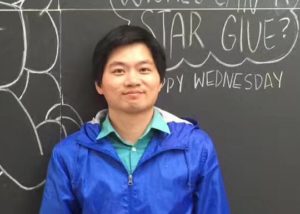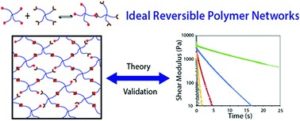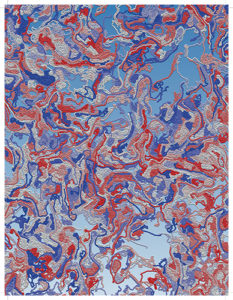Ideal reversible polymer networks have well-controlled network structures and totally reversible crosslinks. They have similarly controlled polymer network structures as ideal covalent polymer networks but they exhibit time-dependent mechanical properties (i.e. viscoelasticity) due to the presence of reversible crosslinks that can associate and dissociate.
Researchers at MIT have provided a new insight into the mechanical properties of ideal reversible polymer networks. They use a 4-arm equal-length short-chain polymer as a unit (as shown in the figure above) to build up the reversible polymer network which can, therefore, be modeled as springs and dashpots in series. Based on this assumption, they theoretically and experimentally showed that the viscoelasticity of ideal reversible polymer networks follows the Maxwell model (G(t) = vekBT exp(kt), in which ve is the concentration of elastically-active chains, kBT is the thermal energy scale). This can be characterized by instantaneous shear modulus (G0= vekBT, which can be tuned by varying concentration, molecular weight, pH, and temperature) and relaxation time (t = 1/k, which can be tuned by pH and temperature).
This study provides a simple yet general method to design the viscoelasticity of polymer networks and to quantitatively measure their kinetic properties. This work develops our understanding of reversible-crosslinked polymers in various systems and provides an insight into how researchers can tune their properties.
Read the full article here: Ideal reversible polymer networks Soft Matter, 2018,14, 5186-5196
About the Writer
 Dr. Xingcai Zhang is a Harvard SEAS Fellow at Harvard University. He was a postdoc researcher at MIT/SYSU. His expertise includes chemistry, bionanomaterials, bionanomedicine, nanotea, natural products, carbon/polymer/natural/two-dimensional materials for biomed/catalysis/absoption/energy applications. Dr. Zhang serves as an Associate Editor for a Springer Nature journal and is on the Advisory Board of a Wiley cancer journal and an editor of a cancer journal. Some of Dr. Zhang`s publications can be found at: http://orcid.org/0000-0001-7114-1095 and Google Scholar and he can be reached at xingcai@mit.edu and mylovetea@outlook.com
Dr. Xingcai Zhang is a Harvard SEAS Fellow at Harvard University. He was a postdoc researcher at MIT/SYSU. His expertise includes chemistry, bionanomaterials, bionanomedicine, nanotea, natural products, carbon/polymer/natural/two-dimensional materials for biomed/catalysis/absoption/energy applications. Dr. Zhang serves as an Associate Editor for a Springer Nature journal and is on the Advisory Board of a Wiley cancer journal and an editor of a cancer journal. Some of Dr. Zhang`s publications can be found at: http://orcid.org/0000-0001-7114-1095 and Google Scholar and he can be reached at xingcai@mit.edu and mylovetea@outlook.com












